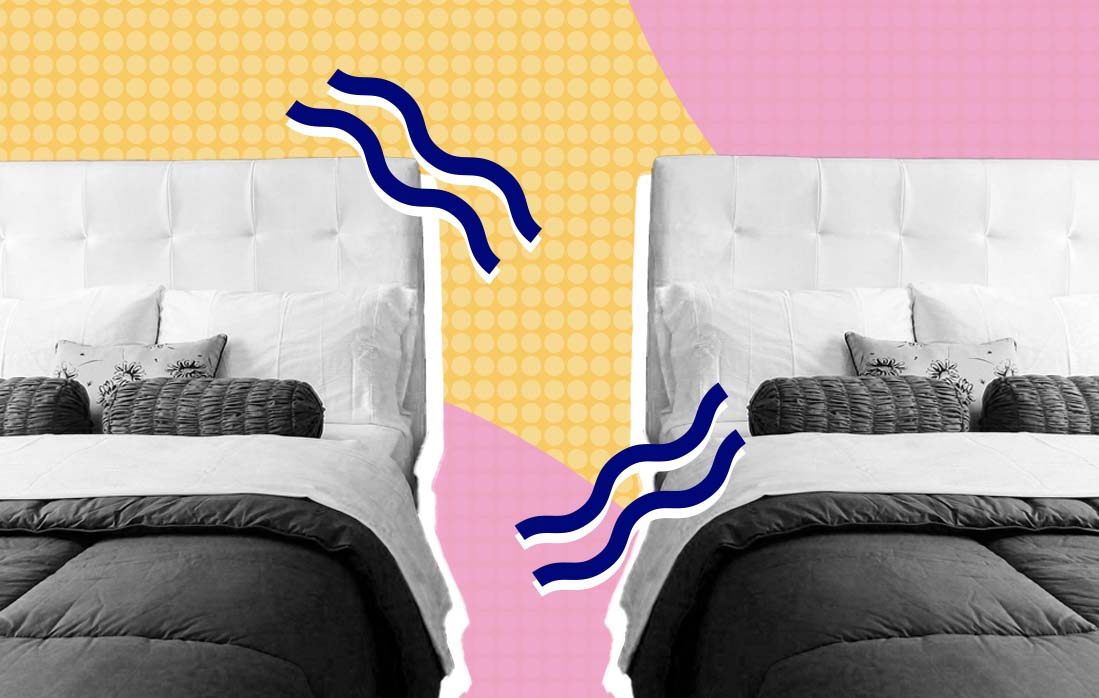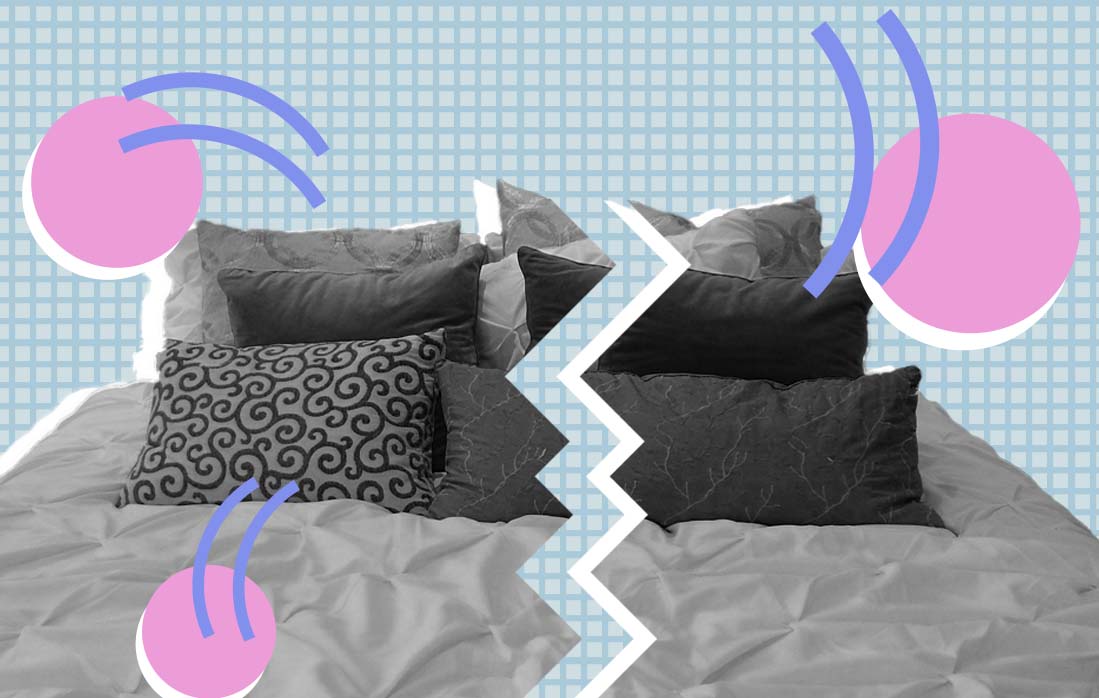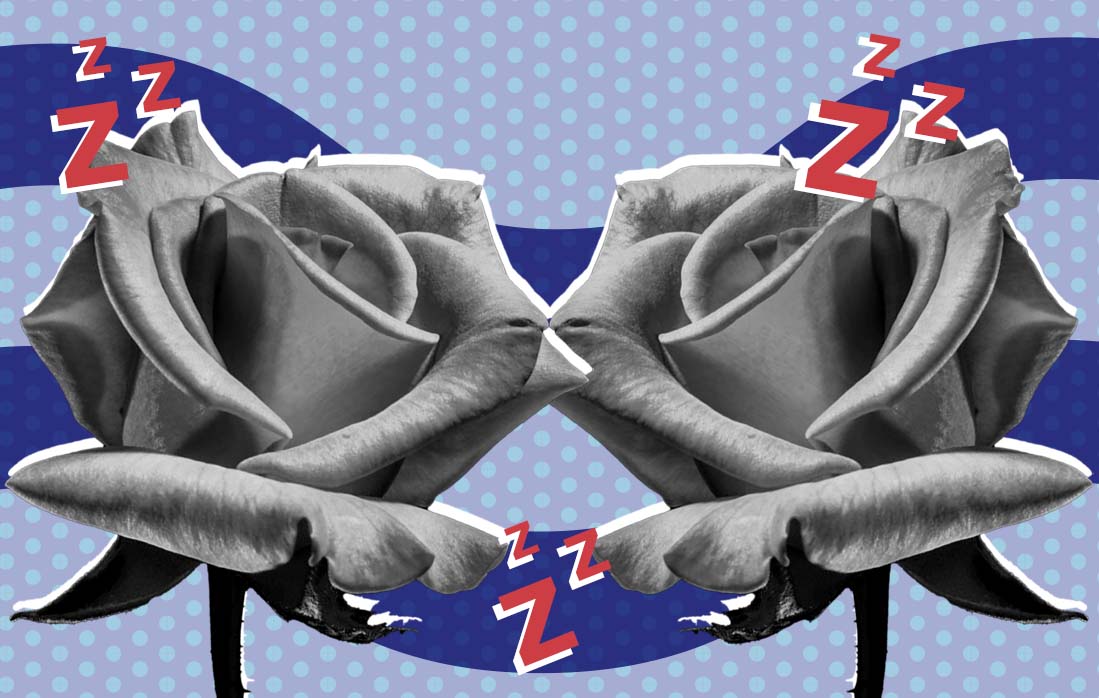
So… have you heard about sleep divorce? It’s been a phrase on the tip of every sleep blogger’s tongue and is essentially defined as the amicable relegation of long-term bedmates to separate rooms, all in the name of saving their relationship.
The theory is this: if you’re losing sleep thanks to your partner’s restless legs, snoring, or body heat, why not just move rooms and ditch the inevitable resentment you’re going to feel toward them for encroaching on your REM cycle? After all, it’s still possible to love someone even if you don’t always love sleeping with them… right?
The answer for many seems to be a resounding yes.
How a Sleep Divorce Might Improve Your Relationship

“It works for a lot of reasons, the most obvious being that we both get more sleep,” wrote sleep divorcee Daryl Austin in an op-ed for the LA Times in March 2018. “I’m a restless sleeper, prone to snoring too. My wife gets much better sleep without me by her side — as she’s reminded every time we go on a vacation together.”
“Because I have time and space to myself, and because I get the sleep my body needs every night, I’m a far more patient and attentive husband and father than I would be otherwise,” he continued. “I’m also much more productive at work and, I suspect, more enjoyable to be around than I would be if I was a tired mess all the time.”
Dr. Bradley J. Katz, a professor and physician at the University of Utah Medical Center and CEO of Axon Optics, says we often get the best quality of sleep while alone, as a restless partner can disrupt our sleep. He says a sleep divorce may be necessary if the effects are severe enough because “not enough sleep over a long period of time can contribute to a higher risk of depression, high blood pressure, diabetes, obesity and more, a weaker immune system and poor concentration.”
A similar case comes from a college professor, Catherine M., who says, “I have my own bedroom, which I insist on (my husband snores).” Snoring appears to be a common reason for this bedtime separation.
Dr Chelsie Rohrscheib, a head sleep expert and neuroscientist at sleep health company Wesper, told us that sleep apnea, a disorder that causes people to be more prone to snoring, is a common reason for sleep divorce, especially for those who use a CPAP machine.
I also caught up with Dr. John O., a radiologist, who recalled an instance of sleep divorce when he first had kids, saying, “We had very young babies that needed to be fed in the middle of the night and I needed restful sleep to function at work the next day.”
While Austin and other bedroom separatists make a strong personal case for sleep divorce, some experts believe sleeping apart could result in a loss of much-needed intimacy between partners.
“I prefer that the couples I work with in couples therapy sleep in the same beds most nights when possible,” Dr. Paulette Sherman told Insider. “Sleeping is usually six to eight hours of bonding time or intimacy where you are near each other.”
“[However], if you feel that a sleep divorce will ultimately prevent a real one, then I think that you can take some proactive measures,” she conceded. “Make sure you have other regular cuddle and alone time together and make time for sex. Make sure that your partner knows that you love them and miss them and that this is just a practical decision to improve both of your health and to address your joint optimal functioning.”
Sleep specialist Wendy Troxel, a senior behavioral scientist at RAND Corporation who authored “Sharing the Covers: Every Couple’s Guide to Better Sleep,” spoke to CNN about the topic. She discussed how there can be some real benefits when it comes to the need for sleeping separately. She noted that her team’s research found it can help you be “a better communicator, happier, more empathic, more attractive and funnier,” as well as less resentful and more appreciative of special time spent together on the weekends. She prefers the process to be called “forging a sleep alliance.”
Sleep Divorce 101

The desire for a sleep divorce can stem from a variety of factors, like snoring, differing schedules, tossing and turning, etc. Let’s see what a sleep divorce could look like for you.
Asking for a Sleep Divorce
This process could look a little different in each circumstance. You and your partner may have quickly come to the conclusion together that a sleep divorce is in order, or you may not be quite on the same page. Whatever it is, it’s important to approach the situation in the right way.
The Knot suggests brainstorming your reasoning and potential solutions ahead of time. You not only want to communicate clearly and honestly, it’s also important to make sure you let your partner know this isn’t a desire for overall separation — just an adjustment in one area of your life. Keeping their feelings in mind is crucial.
Brittney Cobb, a licensed therapist and licensed clinical social worker in North Carolina, told the Knot that the use of “I” statements is a good idea when approaching your partner. You need to not only take ownership of your feelings on the topic but also lead with compassion. Start with statements like, “I really enjoy when we…,” and lead into some of the roadblocks with something like, “I notice how a poor night’s sleep affects…”
If your partner agrees to a sleep divorce, you should also set some ground rules and guidelines for your new arrangement. You may want to start with just a few nights a week and then reassess how it’s working for each of you. Honest communication is key here, and the parameters could look different for different couples.
If your partner doesn’t want to take that step. In a case of disagreement, you’ll want to consider other paths to ensure both you and your partner can be happy together. Though sleep divorce may have its benefits, it’s hardly the only means by which you and your partner can score some mutually-beneficial shut–eye. If what’s troubling you and your bedmate is a difference in sleep preferences, for example, you may just want to consider investing in an adjustable bed. I’d recommend taking a peek at our top picks for the best mattresses for couples.
You should always consult a doctor before attempting a sleep divorce and should explore other methods as well.
Navigating a Sleep Divorce

No sleep divorce is perfect and surely some workshopping will be in order. To keep things as smooth as possible, there are some key areas of your relationship that should be well-attended to and cared for.
- Intimacy. Just because you’ve closed the bedroom door at sleep time doesn’t mean it can’t be wide open for sex. If you prioritize sex regularly, it may be fairly easy to instigate these moments, but if not, think of it as an opportunity to spice things up. Having separate beds can invite added excitement and surprise into your sex life — have fun with it.
- Mutual trust. Keep an open line of communication and follow the rules and changes you put in place. Don’t throw any curveballs and allow your partner to come to you if any concerns or questions arise and vice versa. Stephen Light, the co-owner and chief marketing officer at Nolah Mattress, told us he recommends you “communicate clearly about how you’ve been feeling, and how you have to prioritize sleep for your health.” He adds, “Plus, putting an end to the grouchiness and irritability that come with sleep deprivation can make your relationship a much happier one.”
- One-on-one time. With this new change in your lives, it’s also important to carve out that quality time outside of the bedroom. This is something every couple can benefit from. Perhaps you could make a plan to go to a special dinner every so often, take a monthly weekend getaway, or even take a cooking class together.
Whether you’re willing to stick it out or are quitting bedsharing for good, bringing up the concept of a sleep divorce is no easy feat. It’s important to lead with honesty, love, and compassion for your relationship and your partner when it comes to any big change in the bedroom and in your lives.